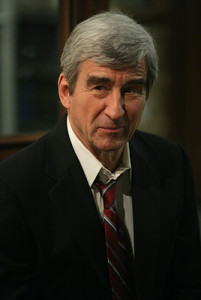Sam Waterston as Jack McCoy
A few weeks ago, I read a great post about Indiana Jones. As a fan of Law & Order, I’ve long wondered how Dick Wolf and his cadre continue to hold my attention episode after episode after episode, and I feel like Soho’s comments are particularly applicable to this question. If I had to simply guess at how long I would enjoy a show like Law before I would have deduced the formulae and then become bored, I think I would have probably given it a year, two years at most. It’s one thing to pull off four movies, but to come up with episode after compelling episode of a TV serial drama? Consider that they have not one, not two, but three successful programs in the fleet, which means that they’re cranking out over 60 episodes every year. That doesn’t even account for the fact that the original Law & Order, by itself, is only two seasons from usurping the record for being the longest continuously running non-news telivision program in television history.
Reading a discussion on the show’s format, you see that two pages worth of information does very little to clarify what exactly does or does not happen. It may seem fairly clear if you read the description having never seen the show, but fans know that, much like Bach, you can at best make only vague, 51%-of-the-time generalizations. I am always astonished at the shear variety. There are, after all, only so many crimes we are interested in watching a show about. I find myself enjoying, as my fellow blogger pointed out, the ‘how’ of it all.’Isn’t that what classical forms are all about? Yet, I still find myself hanging on to the very end wondering how an episode is going to play out. It is completely unlike a typical serial where the final outcome is almost undoubtedly a happy one, or at the very least, it ends in a predictable place. Law offers us no such guarantees. Jerry Seinfeld long ago did a great stand-up bit about how we tend to predict the onset of a two-parter when we realize that, with less than five minutes on the clock, there is no chance of a successful resolution. Wolf must have seen that bit back when Seinfeld was just doing the comedy club circuit back in the 80’s because every episode ends differently. The bad guys win, the good guys lose, the victims shoot the acquitted bad guys, the lawyers get put into witness protection. Nothing is a given. Also, each discrete show has it’s own unique format with casts who have each developed into strong ensembles.
Even more unique is that the characters make very little development over the seasons. We know that one detective is a rape baby, that the current ADA long ago had a falling-out with his daughter(s). We get only tiny windows into their lives. This is unusual, and on the surface, perhaps an unattractive quality, possibly depriving the series of a longer sense of arc. Instead, we get a complete slice of the world in each episode. In an incredibly short 41 minutes of show time, we come to know the new characters of the episode: we sympathize with the victims and hate the perps. We care what happens to them. I sure hope they make it through their record-breaking season, but they’ve already broken the record for sustaining my interest.
This post originally appeared on an older blog.

